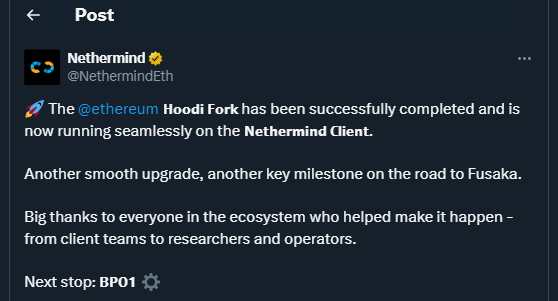TL;DR
- Ethereum’s Fusaka upgrade successfully launched on the final Hoodi testnet, moving closer to its mainnet release on Dec. 3.
- The update implements PeerDAS (EIP-7594) to enhance validator efficiency and prepares for parallel execution and zero-knowledge rollups.
- Meanwhile, the Bitcoin community faces debate as F2Pool co-founder Chun Wang publicly opposes BIP-444, a temporary soft fork aimed at limiting non-transaction data on the network, highlighting growing tensions among developers.
Ethereum’s next major upgrade, Fusaka, has successfully activated on the blockchain’s final Hoodi testnet, signaling a smooth transition toward its mainnet launch scheduled for Dec. 3. The upgrade integrates multiple Ethereum Improvement Proposals (EIPs) aimed at enhancing scalability, efficiency, and security across the network. Nethermind, one of the leading validator clients, confirmed the testnet fork via X, calling it a seamless step forward for Fusaka deployment.
Among the upgrade’s key features is EIP-7594, also known as Peer Data Availability Sampling or PeerDAS, which allows validators to read smaller fragments of layer 2 data rather than full data sets. This significantly reduces computational demands and improves node efficiency, especially as Ethereum continues expanding its rollup-based scaling approach. EIPs like 7825 and 7935 will increase gas limits and enable parallel execution, allowing multiple smart contracts to run simultaneously. Additional proposals enhance zero-knowledge rollup support, an essential part of Ethereum’s long-term scalability plans.
Upgrade Phases And Future Roadmap
Fusaka will roll out in three main phases: the initial mainnet activation, an EIP to increase blob capacity, and a subsequent hard fork to further extend capacity. Once complete, developer focus will shift to the Glamsterdam upgrade, which continues Ethereum’s roadmap through the Surge phase, emphasizing faster and more efficient processing. Despite internal changes at the Ethereum Foundation, ETH recently reached yearly highs due to growing institutional adoption and inflows from crypto ETFs.
Bitcoin Faces BIP-444 Debate
As Ethereum progresses, Bitcoin is grappling with controversy over BIP-444, a temporary soft fork intended to limit non-transaction data. F2Pool co-founder Chun Wang criticized the proposal, calling it misguided and refusing to enforce it. BIP-444, proposed by developer Dathon Ohm, aims to cap non-transaction data at 83 bytes, potentially restricting NFT creation and other data-heavy uses of Bitcoin.

Supporters argue it preserves Bitcoin’s identity as a financial protocol while reducing legal risks for node operators. Critics, however, question its effectiveness and necessity, highlighting ideological differences over Bitcoin’s purpose as either purely financial or more programmable.
The debate illustrates tensions in blockchain development approaches, contrasting Ethereum’s active upgrade path with Bitcoin’s cautious protocol evolution, while both networks continue expanding their influence across the crypto ecosystem.











